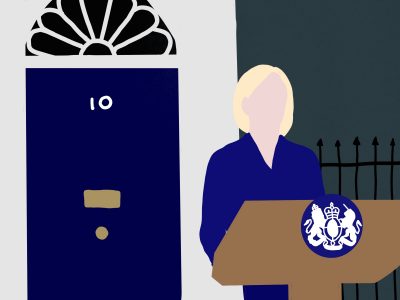Britain is back at it again.
Prime Minister Liz Truss announced her resignation last week after only 44 days in office. It only took her that short amount of time to throw Britain into economic turmoil once again and resign because of it.
The unfortunate fact about this event, along with its being the second bout of political uncertainty in a matter of less than two months, is how it seems that Britain cannot escape the drastic economic problems it has faced since Brexit.
What should Britain do to end this pattern? Or, can they do anything? These are the questions the world is waiting to learn the answer to, and based on Britain’s recent past, it is unlikely that their economic problems will fix themselves anytime soon.
Let’s do a quick rundown of Britain’s economic problems in the last decade.
Since 2012, there have been a mix of inclines and declines in the UK’s GDP per capita. The most major declines in GDP were during 2016, due to the Brexit vote on June 23, 2016, and in 2020 due to the COVID-19 pandemic and the completion of Brexit. Britain also had another significant economic decline in 2015.
The ongoing energy crisis in Europe and the death of Queen Elizabeth II also further damaged the British economy by creating instability in the country.
Evidently, Britain has had some very intense economic issues in the past decade, caused mostly by external factors — but some from their own mistakes.

Inflation in the UK hit 10.1% last month, and food prices are increasing faster than they have in the last four decades. There is also a consumer spending collapse, labor uproars and the cost of living has skyrocketed.
All of this, combined with the political instability of the UK and two prime ministers resigning within a matter of three months has thrown Britain into the economic unknown.
One has to wonder when looking at this economic crisis in the UK, what part is Truss’s fault and what part is the fault of the current global turmoil.
There has certainly been a great deal going on in the world in recent months that are causing global economic problems, ranging from the Russia-Ukraine war to the oil production cuts from OPEC and the ongoing COVID-19 pandemic that is entering its third year.
Inflation is sky high in many countries around the world, and the stock market, while doing better currently, is still in a rough spot compared to the beginning of the year.
Still it seems that Britain’s recent economic problems are not primarily caused by the factors mentioned above, but by Truss’s disastrous economic plan.
The basics of Truss’s plan included massive tax cuts — which happen to favor the UK’s most wealthy and would be funded by borrowing money.
Besides the problem of the tax cuts primarily benefiting the upper class instead of those who really do need it, one essential consequence of borrowing money is that it often leads to increased inflation.
The idea that Truss would push forward an economic plan that has a history of increased inflation is incomprehensible. And to add insult to injury, she only stepped back from this policy after the economy went into a full blown crisis — but by that point, it was already too late for Truss to recover.
It is clear from the results of her economic policy that it was this very policy that has caused Britain so many problems in recent weeks — not the outside world nor the Queen’s death. Nothing and no one is to blame for the current British economic crisis other than Truss.
It is incredible that Truss was able to accomplish this within a matter of 44 days — but she indeed managed to do it, and with flying colors too.
What is to be done next? Hope that Rishi Sunak, the incoming prime minister who is dubbed “Rishi Rich” by the British tabloids due to his massive wealth, can manage the British economy better than Truss did. And hope that the British economy can recover before it falls off the deep end.




























































































































